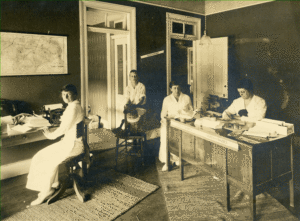 This is the year, 2020, when we should be celebrating one hundred years since women won the right to vote. Actually, it was only white women who won the right to vote in 1920 as the white suffragists turned their backs on black women suffragists to get the votes of Southern senators. That is a shameful chapter in our history that I wrote about in a previous article. But my point today is based on an interesting piece in the New York Times by Alisha Haridasani Gupta about the parallels between 1920 and 2020.
This is the year, 2020, when we should be celebrating one hundred years since women won the right to vote. Actually, it was only white women who won the right to vote in 1920 as the white suffragists turned their backs on black women suffragists to get the votes of Southern senators. That is a shameful chapter in our history that I wrote about in a previous article. But my point today is based on an interesting piece in the New York Times by Alisha Haridasani Gupta about the parallels between 1920 and 2020.
All the big celebrations planned for 2020 to celebrate the passage of the Nineteenth Amendment in 1920 have been canceled because of the COVID-19 pandemic. Large gatherings and celebrations cannot take place this year as we battle this virus. Gupta points out that the Spanish flu pandemic of 1918 also had a direct impact on the women’s suffrage movement. The campaign to secure women’s right to vote had built strong momentum in 1918, which, Gupta notes, was “quickly dissipate[d] in 1918 as the country shut down public gatherings and ordered people to stay home” to fight the Spanish flu pandemic. In fact, the Nineteenth Amendment came close to passing in 1918 and had the backing of the president, Woodrow Wilson, but fell two votes short of passing in the Senate. One of the key reasons it failed in the Senate was because Southern senators were afraid of black women being able to vote. Gupta cites the work of Elaine Weiss, author of The Woman’s Hour: The Great Fight to Win the Vote. Weiss explained that the Southern senators objected because they held “the idea that if black women can vote, they might think they’re socially equal too and then the whole premise of white supremacy is eroded.”
Forced to abandon public rallies and campaigning, the suffragists “burned up the telephone lines and sent letters and took ads in newspapers,” according to Weiss. They were fighting for the election of senators who would vote for women’s suffrage. Indeed, they defeated the antisuffrage lawmakers and voted in new prosuffrage ones. The next year both the House and Senate approved the Nineteenth Amendment, and it was ratified as a constitutional amendment in 1920. Weiss notes that the suffragists persisted and “used all the tools of democracy . . . to change the system.”
Here we are in 2020, in the middle of the COVID-19 pandemic in a very important election year. We can learn from our foremothers about not letting a pandemic stop us from working to save our democracy. If they could make phone calls and write letters to get candidates elected who supported their cause, we can too. Let’s get busy. November will be here before we know it, and there is no need to let the current pandemic keep us from being engaged.
Photo courtesy of State Archives of North Carolina Raleigh, NC (The Commons)